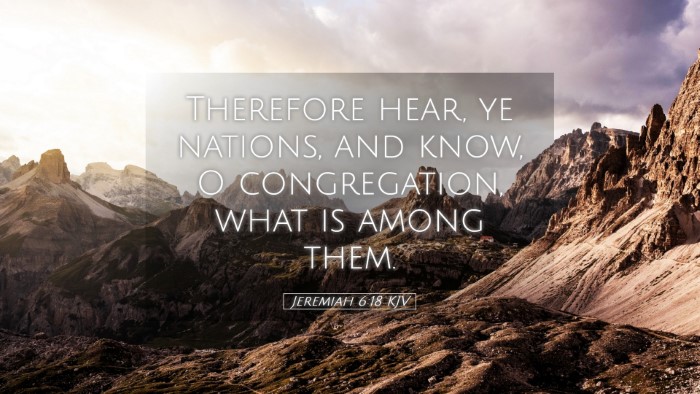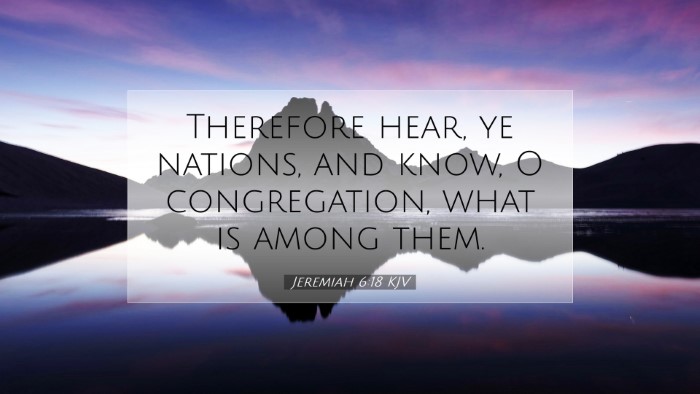Commentary on Jeremiah 6:18
Scriptural Context: Jeremiah 6:18 states, “Therefore hear, ye nations, and know, O congregation, what is among them.” This verse is part of a prophetic warning given by the prophet Jeremiah to the people of Judah. The context reveals a deteriorating spiritual state and impending judgment that calls for attentive ears from both Israel and the surrounding nations.
Examination of Text
Significance of the Audience: The verse addresses not only the people of Judah but also the nations surrounding them. This broad audience underscores the universality of God's message of judgment. The call to “hear” suggests that there is a vital truth being declared that transcends local boundaries, alluding to the sovereignty and justice of God that applies to all people.
Insights from Public Domain Commentaries
Matthew Henry's Commentary
Matthew Henry emphasizes the importance of the call to the nations, noting that the divine message must reach beyond the immediate audience. He suggests that the “hearing” of the nations implies a responsibility to respond to God's truth. This highlights the concept of accountability that all nations have before the Lord.
- Attention to God's Message: Henry insists that understanding the significance of God's message is essential for both the nation of Judah and the surrounding nations. The call to “know” indicates that there is a necessary comprehension and acknowledgment of the circumstances facing them.
- Impending Judgment: The context of impending judgment is a central theme in Henry’s commentary. He expounds on the nature of God as a righteous judge who will not overlook sin. He articulates that the acknowledgment by the nations of their own moral state, in light of God’s demands, is crucial.
Albert Barnes' Notes on the Bible
Albert Barnes approaches this verse with a careful explication of the prophetic gloom cast over Judah. He asserts that the call to hear and know the implications of God’s revelation is aimed at both the insiders and outsiders, signifying that God's truth must permeate all sectors of society.
- National Responsibility: Barnes emphasizes that there is a collective responsibility among nations to respond to divine judgment. His interpretation calls on leaders and communities to be aware of their decisions and align them with God's will.
- Universality of God's Law: The invitation for the nations to listen is indicative of the universality of God's law. Barnes articulates that this extends an invitation for repentance and reflects God's desire for all people to come to a knowledge of the truth.
Adam Clarke’s Commentary
Adam Clarke offers a detailed examination of the implications behind Jeremiah 6:18. He argues that God's warning serves as both a promise of judgment and a call to repentance. Clarke's insights advocate a serious consideration of the moral and social conditions prevalent in both Judah and the nations.
- Human Response to Divine Revelation: Clarke stresses the necessity of a correct human response to God's revelations. He points out that hearing must be followed by action—a transformation of lifestyle and thought that reflects an understanding of divine truth.
- Historical Significance: Clarke also highlights the historical context of the verse, providing insights into the social and political conditions of the time. He notes that recognizing the past actions of nations can inform present-day behaviors and decisions.
Theological Implications
This verse opens up a myriad of theological reflections that hold significance for contemporary readers:
- Corporate Judgment: The concept of collective accountability before God is central to understanding this verse. It invites both scholars and laypersons to meditate on the moral and spiritual state of communities and nations today.
- Faithfulness to Prophetic Call: Jeremiah’s role as a prophet exemplifies the necessity for faithful proclaimers of God's word. Pastors and leaders are reminded of their duty to call congregations to awareness and understanding of God’s truth.
- The Nature of God’s Justice: There is a profound statement regarding God’s justice and mercy taught in the verse. Even amidst judgment, there is an underlying call to repentance that demonstrates God’s desire for His creation to turn back to Him.
Practical Application
As we reflect on Jeremiah 6:18, several key applications emerge for modern believers:
- Embrace Prophetic Voices: Engage with both contemporary and historical prophetic voices that call attention to societal injustices and spiritual apathy.
- Understand the Depth of God’s Word: Dive deeply into scriptural passages, recognizing that they are layered with significance relevant to our current context.
- Encourage Corporate Repentance: Foster discussions around the need for communities and nations to acknowledge their failures and seek God’s forgiveness collectively.
- Actively Listen: As the text calls nations to “hear,” so too believers today are encouraged to actively listen—not just with their ears but with their hearts, seeking to implement God’s truths into their lives.
Conclusion
Jeremiah 6:18 serves as a profound reminder of the need for attentive listening to God's message. The insights gained from public domain commentaries help to illuminate the text's significance, revealing the weight of accountability both for ancient recipients of the prophecy and for contemporary audiences. Pastors, students, and scholars alike are called to reflect on their own responses to God's revelations, aspiring toward a heart that seeks to align with divine truth.


